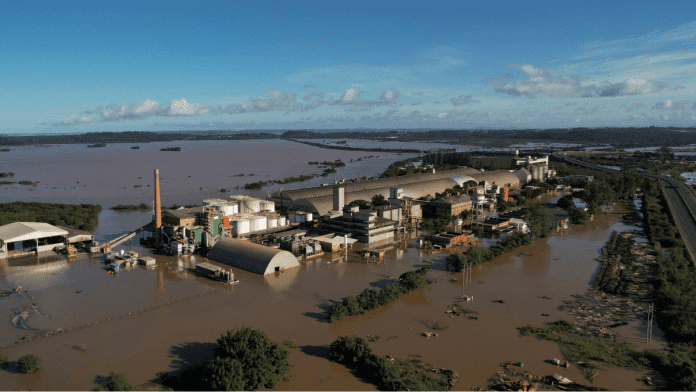News in Brief:
– Extreme rains and floods in Southern Brazil have devastated citrus crops, causing significant fruit losses.
– Farmers’ motivation is waning due to recurring climate events, threatening future agricultural planning and productivity.
Last month’s extreme rains and floods in Southern Brazil, particularly in Rio Grande do Sul, have dealt a severe blow to farmers. The adverse weather coincided with the critical fruiting phase of key citrus varieties like bergamot Caí, Ponkan, and Pareci, disrupting their harvests.
According to a report by Emater-RS, over 103,000 tons of bergamot and oranges were lost, affecting more than 7,200 producers. The combination of flooding, river overflows, and persistent heavy rainfall resulted in soil saturation. This lack of soil oxygen (or hypoxia) damaged the root systems of plants, causing tissue death and leading to significant fruit drop. Additionally, a sharp temperature drop exacerbated the damage.
Beyond the immediate physical damage, there is a growing concern about the psychological impact on farmers. Luis Bohn, a technical assistant manager at Emater/RS-Ascar, highlighted a worrying trend: many growers, particularly those cultivating grapes and citrus, are losing motivation. This demotivation stems from a series of adverse climatic events, with the latest disaster pushing many to consider abandoning their farms or relocating.
Bohn used to opportunity to emphasise the critical role of motivation in agricultural productivity. A demotivated farmer is less likely to plan effectively, which is essential for successful farming. For instance, a farmer who neglects timely pruning can significantly reduce their orchard’s productivity. This issue underscores the need for mental resilience and robust support systems for farmers facing such adversities.
Global implications and lessons
The challenges faced by Brazilian farmers have broader implications for the global agricultural community. Here are some key takeaways:
- Resilience and Adaptation
-
- Weather Extremes: Farmers worldwide must prepare for increasing weather extremes. Implementing robust drainage systems, diversifying crops, and adopting resilient farming practices can mitigate some risks.
- Support Systems: Governments and agricultural organizations should provide psychological and financial support to help farmers recover from disasters and stay motivated.
2. Technological Innovations
-
- Soil Health Monitoring: Investing in technologies that monitor soil health and moisture levels can help farmers anticipate and respond to adverse conditions more effectively.
- Weather Forecasting: Enhanced weather forecasting tools can give farmers advance notice of potential climate threats, allowing them to take preventive measures.
3. Community and Collaboration
- Knowledge Sharing: Farmers should engage in knowledge-sharing networks to learn from others who have successfully navigated similar challenges.
- Collective Action: Community-based initiatives can offer mutual support and resources, helping farmers to rebuild and adapt more efficiently.



